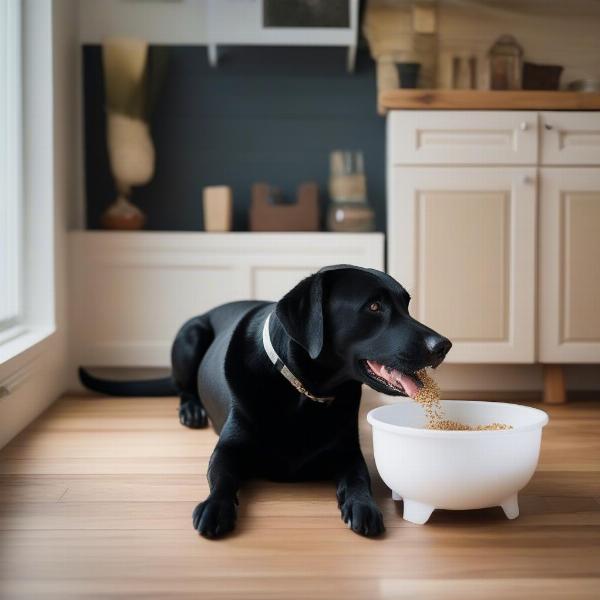Finding the best dog food for your black Lab can feel overwhelming with so many options available. From puppyhood to their senior years, a black Lab’s nutritional needs change, and choosing the right food plays a crucial role in their overall health, energy levels, and even coat sheen. This guide will explore the key factors to consider when selecting the perfect food for your black Lab, offering insights into ingredients, life stage requirements, and potential health concerns.
Understanding Your Black Lab’s Nutritional Needs
Black Labs are known for their active lifestyles and hearty appetites. Their diet should support their high energy levels and help maintain a healthy weight. A balanced diet for a black Lab should include high-quality protein sources, healthy fats, carbohydrates for energy, and essential vitamins and minerals. Just like humans, Labs thrive on a well-rounded diet.
Key Ingredients to Look For
When examining dog food labels, look for these key ingredients:
- High-quality protein sources: Chicken, beef, lamb, fish, and eggs are excellent sources of protein, providing the building blocks for strong muscles and a healthy coat.
- Healthy fats: Sources like fish oil, flaxseed oil, and chicken fat contribute to healthy skin, a glossy coat, and cognitive function.
- Carbohydrates for energy: Brown rice, sweet potatoes, and oats provide sustained energy for your active Lab.
- Essential vitamins and minerals: Look for a balanced blend of vitamins and minerals to support overall health and immune function.
Life Stage Considerations: Puppy, Adult, and Senior
Your black Lab’s nutritional needs will change throughout their life.
Puppy Food (Up to 1 year)
Puppies require a diet rich in calories and nutrients to support rapid growth and development. Look for puppy-specific formulas with higher protein and fat content.
Adult Food (1-7 years)
Once your Lab reaches adulthood, their nutritional needs shift. Adult dog food formulations are designed to maintain a healthy weight and provide sustained energy.
Senior Food (7+ years)
As your Lab enters their senior years, their metabolism slows down. Senior dog food formulas are typically lower in calories and fat to help prevent weight gain and often include ingredients to support joint health.
Addressing Common Health Concerns in Black Labs
Black Labs are prone to certain health issues, such as hip and elbow dysplasia, obesity, and certain allergies. Choosing the right food can help mitigate these risks.
- Joint Health: Look for foods containing glucosamine and chondroitin to support joint health.
- Weight Management: If your Lab is prone to weight gain, consider a lower-calorie formula or consult your veterinarian for portion control guidance.
- Allergies: If your Lab has food allergies, opt for limited ingredient diets or hypoallergenic formulas.
 Senior Black Lab with Slow Feeder Bowl
Senior Black Lab with Slow Feeder Bowl
Choosing the Right Brand
While ingredient quality is paramount, consider your budget and your dog’s preferences. Don’t be afraid to experiment with different brands to find one that your Lab enjoys and that meets their nutritional needs.
Conclusion
Selecting the best dog food for your black Lab is a crucial part of responsible pet ownership. By understanding their specific nutritional requirements and considering factors such as life stage and potential health concerns, you can help your loyal companion thrive. Remember to consult with your veterinarian for personalized recommendations tailored to your black Lab’s individual needs.
FAQ
- What is the best type of protein for a black Lab? High-quality animal proteins like chicken, beef, lamb, fish, and eggs are ideal.
- How much should I feed my black Lab puppy? Follow the feeding guidelines on the puppy food packaging and consult with your veterinarian.
- Can I give my black Lab human food? While some human foods are safe for dogs, others can be toxic. Consult with your vet before giving your Lab any human food.
- What are signs of a food allergy in a black Lab? Itching, skin irritation, digestive upset, and ear infections can be signs of a food allergy.
- Should I switch my senior black Lab to senior food? Yes, senior dog food formulas are designed to meet the changing nutritional needs of older dogs.
- What if my black Lab is a picky eater? Try different brands and flavors until you find one your Lab enjoys.
- How often should I feed my black Lab? Most adult Labs do well with two meals per day.
dog friendly pubs porthmadog
widemouth bay dog friendly
blackpool hotels dog friendly
dog search word
About ILM Dog
ILM Dog is your trusted resource for comprehensive information on dog breeds, health, nutrition, training, and care. We cover everything from choosing the right breed to providing expert advice on senior dog care. With a focus on providing practical and up-to-date information, ILM Dog connects dog owners worldwide with reliable resources. Contact us at [email protected] or +44 20-3965-8624 for expert advice tailored to your dog’s needs.